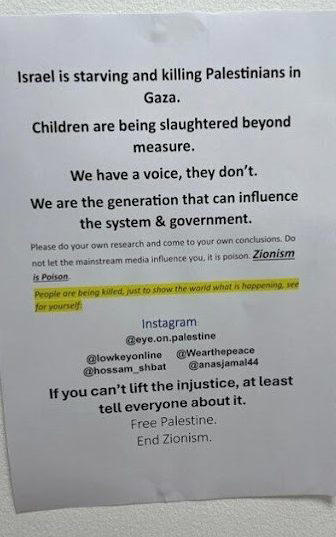Anti-Israel activists targeted a major London hospital this past week prompting an apology from administrators and complaints that Jewish patients were being harassed in violation of equality laws.
Posters discovered at University College London Hospital’s neurology wing accused Israel of “starving and killing Palestinians in Gaza” and declared that “Zionism is Poison.” One Jewish patient who encountered the posters while seeking medical treatment described feeling “vulnerable and scared.”
“I’m an outpatient, but God forbid in other circumstances to feel so vulnerable already and be surrounded by hostility would be so scary. I shouldn’t have to remove my Star of David necklace to go to a hospital visit,” the patient told the Telegraph.
In response, UK Lawyers for Israel sent a formal letter to hospital leadership accusing administrators of violating the 2010 Equality Act.
“In this case, the trust has created an intimidating, hostile and offensive environment for your Jewish and Israeli patients,” Caroline Turner, the organization’s director wrote. “Any patient visiting the hospital is already feeling in a vulnerable condition, and it feels extremely cruel to subject them to something that would further increase their stress.”
“Zionism is the belief in a Jewish state of Israel, and in self-determination for the Jewish people,” she explained. “Denying the Jewish people self-determination is anti-Semitic, according to the IHRA definition of anti-Semitism.”
UCLH chief executive David Probert swiftly issued an apology “for the distress and upset caused” by the posters and noted the posters have been removed.
“At UCLH, we value diversity and inclusivity, and we are committed to providing a fair and non-discriminatory service to all individuals, regardless of background,” Probert said. “This matter was immediately treated as an incident, and all the posters were removed without delay. Senior members of staff conducted a walk-around to ensure no further posters remained.”
Beyond removing the antisemitic posters, hospital administrators sent reminders through departmental newsletters about policies prohibiting political messaging. Security also received instructions to stay alert for similar materials, and staff were encouraged to report any unauthorized postings they discovered.

Source link












